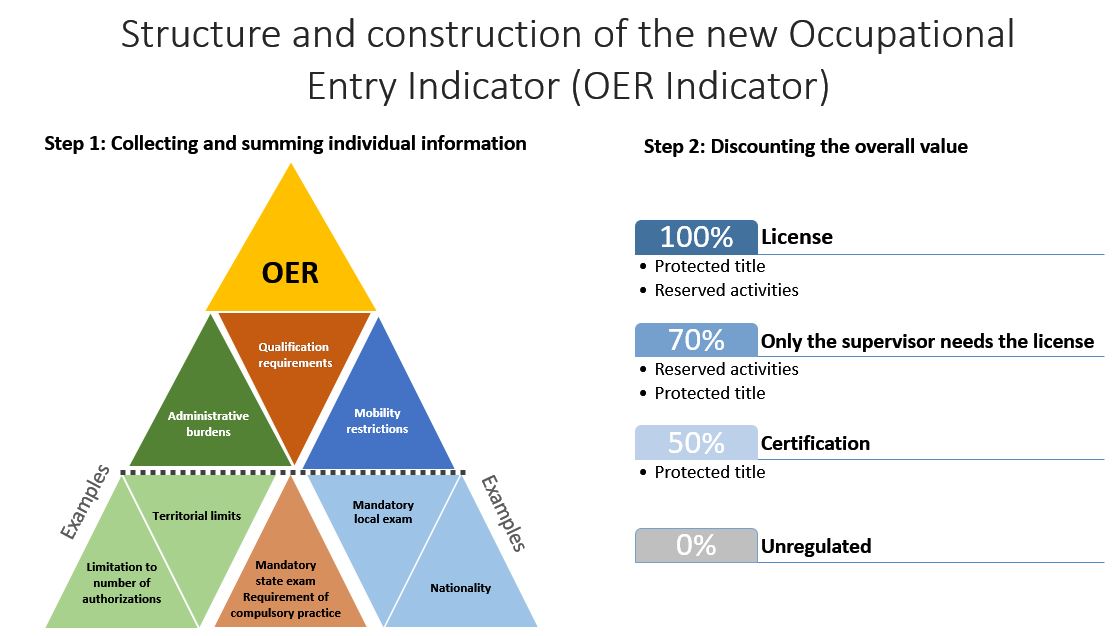Occupational entry regulations (OER) and their effects on productivity in services
Measuring occupational entry regulations: a new OECD approach
► The average regulatory stringency is significantly lower in personal services than in professional services.
► Mobility restrictions are sometimes high even for professionals moving between states in the US, provinces in Canada, or countries in Europe. This is surprising given the various policy initiatives aimed at facilitating the movement of professionals within these economic areas.
► The regulatory variance of personal services amid European countries, US states, and Canadian provinces is wide, suggesting the need for better integration of services in all three economic areas.
► Occupational regulations typically take the form of licensing requirements, the most stringent form of regulations. Only very few countries, most of which are in Europe, allow for alternative schemes, including certification.
► The difference in OER levels between personal and professional services is particularly stark in India and South Africa, possibly due to the size of the informal sector, making it difficult to regulate, low-skilled personal services. At the same time, the quest for signalling the quality of professional services could explain the regulatory levels much above that of the other countries in this sample.
► Dowload the figures
Occupational entry regulations and their effects on productivity in services: firm-level evidence
► Bold reforms easing occupational entry regulations, especially those concerning qualification requirements, could help increase the contribution of personal and professional services to aggregate productivity growth via two channels: the acceleration of their catch up to best global practices (within-firm channel), where firms in regulated sectors could gain up to 2.5 percentage points of productivity on average; and a higher contribution of labour reallocation to firms’ employment growth (between-firm channel), which could increase by up to 10 percent for the most productive firms.
► Given the scope for reform and the sizeable positive effects on productivity, our results are supportive of the need to (i) review regulations in the light of changing public interests, technological developments and international experience, (ii) shift the focus of regulations from inputs to outputs wherever possible, and (iii) check the implications of regulations for competition and explore new ways to deliver better information to consumers.
► Dowload the figures
New OER indicator - Data
The OER Indicator is a novel cross-country composite indicator measuring the stringency of occupational entry regulations across all US states, Canadian provinces, 15 European countries, Israel, India and South Africa, for a set of five professional (accountants, architects, civil engineers, lawyers and real-estate agents) services, nine personal services (aestheticians, bakers, butchers, driving instructors, electricians, hairdressers, painters, plumbers and taxi drivers ) and nurses. At the most aggregate level, the indicator differentiates between three types of occupational regulations: licensing, a situation in which only the manager/supervisor requires a license, and certification. Further, the indicator assesses the regulatory barriers along three dimensions: administrative burdens, qualification requirements and foreign entry restrictions. It provides a comparative source of information on the various approaches used across countries to regulate entry into services, notably distinguishing between different areas of regulation (administrative, qualification and mobility requirements) and different types of regulation (licensing, a situation in which only supervisors require a license, and certification).
> DATABASE
Events
Workshop: The economic consequences of occupational licensing
Paris, 11th October 2019
The OECD organised a workshop on the economic consequences of occupational licensing on the 11th of October, 2019. It featured the most-cited experts in the field:
- M. M. Kleiner (Professor, University of Minnesota)
- Davud Rostam-Afschar (Assistant Professor, University Hohenheim)
- Mario Pagliero (Professor, University of Turin)
- Maria Koumenta (Lecturer, Queen Mary University of London).
> Agenda
Background material
Do occupational entry regulations affect productivity in services?, by By Indre Bambalaite, Giuseppe Nicoletti and Christina von Rueden, Ecoscope Blog (March 2020)
Rethinking occupational entry regulations by Indre Bambalaite, Morris Kleiner, Giuseppe Nicoletti and Christina von Rueden, VoxEU (April 2020)
Occupational licensing and job mobility in the US by Mikkel Hermansen
A Primer on Emergency Occupational Licensing Reforms for Combating COVID-19 , Mercatus, March 2020
